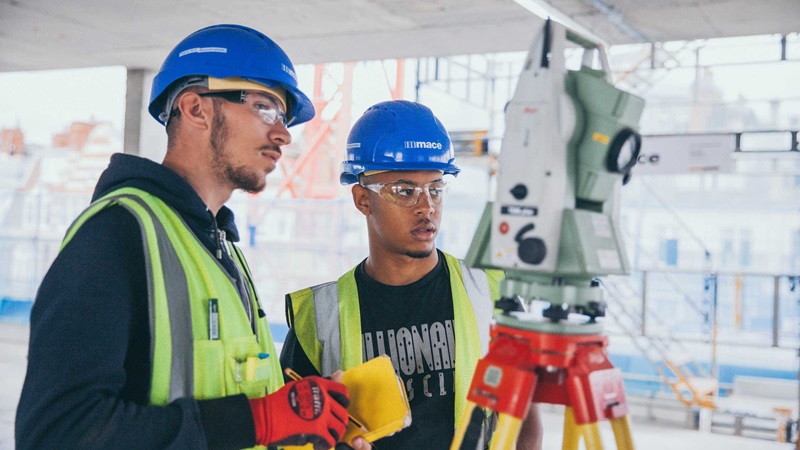Apprentices are the future of the built environment - here's why
This article is part of our Grow Together perspective series, highlighting the opportunities and culture of the industry.
National Apprenticeship Week takes place in February this year and carries over the same theme from 2021 – ‘Build the Future’. It’s a motif that we at Mace can relate to in more ways than one and we’re proud to say that we have a long history of supporting apprenticeships, stretching back more than 30 years.
In particular sectors, apprenticeships are a time-honoured tradition. However, within the built environment, the modern-day apprenticeship is far from a simple legacy of the past. Apprenticeships are now even more pivotal in shaping the development and prosperity of the industry than ever before.
While we continue to redefine ambition, develop economic infrastructure, creating opportunities for communities to thrive, we must be ever-conscious of the talent we need to attract and retain to ensure the successful delivery of our projects. Supporting the future experts and leaders of the built environment is essential to growing and strengthening both our business and the industry.
Shaping skillsets
Why are apprenticeships so important? Well, to state the obvious they offer an alternative route into employment with none of that higher education associated debt – with the added opportunity to earn while you learn.
From an individual point of view, they’re a unique opportunity to ‘try before you buy’, build relationships and pick the brains of those on the frontline. But one of the longest standing benefits of apprenticeships is that they allow both recruits and employers to shape the skillsets they need to succeed – collaborating to address industry skills shortages and at the same time, transform individuals into candidates tailor-made for their roles.
As an apprentice, you’re able to focus on specific business objectives from day one and absorb a company’s purpose and priorities from the very beginning of your tenure. This means apprentices often rise through the ranks more effectively – they are essentially fledgling site supervisors, managers and project leads, who can take up those roles with in-depth understanding of both the company and the future needs of the sector as a whole. For example, Mace's first cohort of degree-level apprentices - who joined the business in 2016 - graduated in 2021, with 90% of this cohort now at manager grade.
Tackling stereotypes
Working in the built environment is a career like no other - but the image of the industry as muddy and labourious is one that remains difficult to shake.
It’s crucial then that through apprenticeships we continue to disavow such outdated stereotypes. Mace apprenticeship schemes offer opportunities in a wide variety of areas including digital, project management, civil engineering, quantity surveying, design management, construction management, building services. The built environment prides itself on the embrace of new technology and that type of innovation must be applied in our recruitment too – apprenticeships are a breeding ground for fresh ideas and fresh approaches.
It’s pivotal that apprentices are each given real responsibilities and a part to play in high-performing teams, to really get to grips with the ins and outs of their roles. At Mace, our apprentices get hands-on with cutting-edge technologies, experience some of the UK’s most complex infrastructure projects and have worked on some of our most iconic projects - the London Eye, Tottenham Hotspur Stadium and The Shard to name but a few.
An inclusive environment
At Mace, our commitment to attracting, developing and retaining diverse talent is a key aspect of our 2026 strategy. And apprenticeships play an enormous part in allowing the industry to build a more inclusive workforce.
For the individual, an apprenticeship not only offers the opportunity to gain a qualification for those from more disadvantaged backgrounds, but can also help to improve social mobility.
Diversity can speed up the pace of innovation in any industry but is particularly beneficial within the built environment, where project teams can draw on ideas from individuals with different backgrounds and experiences. It also helps to build an authentic work environment, reflective of the diverse communities they build in.
Knowing the value of diversity in driving productivity is a step in this direction – and despite having some way to go, the signs are encouraging. At Mace, we recruited 106 graduates and apprentices in 2021 - with 65% of this intake female and 36% of this group identifying as BAME.
The workforce of tomorrow
The industry has to accept that the main purpose of an apprenticeship is to build confidence – for apprentices to have faith that the skills they are learning will help them succeed, progress and thrive and that there is a genuine commitment from their employer for that to happen. Not all job roles in the construction and the broader built environment sector are available as apprenticeships, but the number is increasing all the time and we must work hard to ensure they are fit for purpose and act as a rewarding pathway to exciting careers.
Great apprenticeship schemes lead to great workers - so it’s imperative that businesses play their part in ensuring the youth of today become the workforce of tomorrow. If the goal is to keep skilled workers in construction, that mission starts at the very beginning.
At Mace, we currently have 132 apprentices on-programme. Our numbers continue to rise too – we hired 49 apprentices in 2021, a 69% increase on 2020, and are set to recruit 70 in 2022. Applications open in September each year – find out more via our careers site here.
But don’t just take it from me, you can hear first-hand about what it’s like to be an apprentice over on our social media channels, as in celebration of #NAW2022, several of those on-programme share the details of their placements and explore how they’ve developed during their time at Mace so far.
As we look to the years ahead, a crucial part of how our economy thrives again will be rooted in the success of our young talent.












